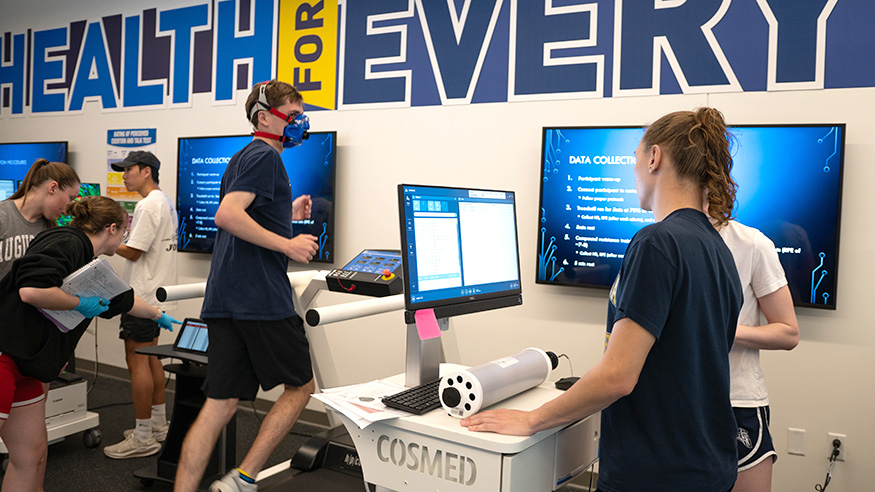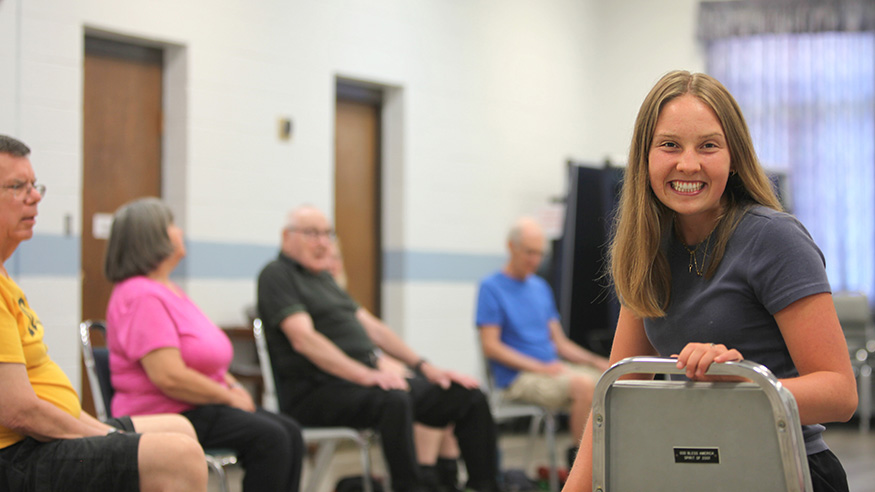2025-26 catalog
SHAUN EDMONDS, Associate Professor
A.S., Parkland College; B.A, University of Illinois, Urbana-Champaign; M.A., San Francisco State University; Ph.D., University of Maryland, College Park
ELIZABETH LEAL-ALFARO, Assistant Professor
B.S., Texas A&M University-Corpus Christi; M.S., Texas A&M University-Corpus Christi; Ph.D., Oklahoma State University
JEFF METTLER, Assistant Professor
B.S., University of South Dakota; M.S., University of Kentucky; Ph.D., Iowa State University
MAJOR IN KINESIOLOGY. 36 credits, including KINS-100, KINS-250, KINS-251, KINS-300, KINS-330, KINS-464, and 12 elective credits. Students may take BIOL-351 and BIOL-362 instead of KINS-251. This is particularly important for students who plan to go to graduate school or continue into a health profession program of study. Note: BIOL-362 has BIOL-130 as a prerequisite.
MINOR IN KINESIOLOGY. 24 credits, including KINS-100, KINS-250, KINS-251, KINS-300, KINS-330, and 4 elective credits. Students may take BIOL-351 and BIOL-362 instead of KINS-251. This is particularly important for students who plan to go to graduate school or continue into a health profession program of study. Note: BIOL-362 has BIOL-130 as a prerequisite.
NOTE ON LABORATORY COURSES: In courses that require a co-requisite lab section, the lecture and lab grades are both factored into the final lecture grade. Successful completion of all KINS lab courses require registration and a passing grade in both the lecture and lab sections.
Elective Credits. Students must work with their advisor to design their set of elective credits for the major or minor from the following courses: ENGL 125s (Literature & Sports), HEPE 213 (Athletic Injuries), HEPE 250 (Tape and Brace for Ortho Injuries), HEPE 370 (Ortho Eval Athletic Injuries), HEPE 371 (Ortho Rehab Athletic Injuries), PHIL 312 (Philosophy of Medicine), PUBH 350 (Health Behavior & Promotion), HIST 250 (Parade of Nations), KINS 220 (Issues in Sports), KINS 270 (Japan Sport & Culture), KINS 320 (Sporting Hollywood), KINS 336 (Impact of Footwear), KINS 350 (Strength & Conditioning), KINS 380 (Special Topics).
Grade Point Average Notation: All courses listed in the catalog as required courses for any major and/or minor, including those courses outside of the department or with a different subject coding, are considered part of the major and will count in the grade point average. Some departments may have additional grade requirements for the courses offered within their department. Recommended supporting courses that are optional and not required may also count in the major depending on the program. For more information see your department chair or the degree requirements for Bachelor of Arts and information on Majors/Minors.
Courses (KINS)



